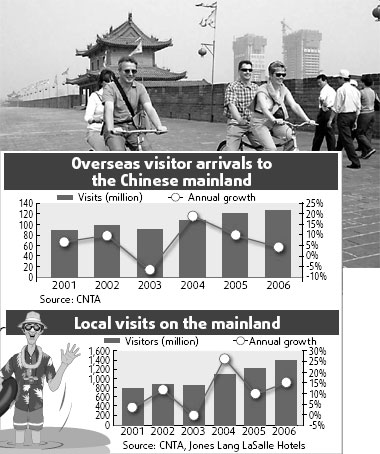| Tools: Save | Print | E-mail | Most Read |
| Quality Crucial in Tourism Growth |
| Adjust font size: |
The increasingly heated tourism market in China is not only creating enticing business opportunities for tourism-related entities, but also leaves questions about how to leverage resources to better serve more discerning travelers.
Travel, in The urban population, at whatever age, involved in whatever job, is passionate about traveling. It is not only about time, it is not only about money - it is about enjoying life. In recent years, tourism in In 2006 alone, In the next decade, the industry's annual growth rate is expected to reach 10.4 percent. Revenues from individual tourism is projected to enjoy an annual growth rate of 9.8 percent, with group tourism projected to grow 10.9 percent. In 2010, the sector will make an even larger contribution to the nation's economy, making up 8 percent of its gross domestic product, compared to the current 5.44 percent. In 2020, However, the seemingly enticing market will not necessarily translate into fat business figures for industry players if they cannot appropriately seize the opportunities. Why? Higher requirements for the quality of products and services from Chinese travelers is making it more difficult for the sector - including hotels, travel agencies and scenic destination operators - to make clients happy. As a way to relax or reward themselves after a period of hard work, Chinese are more frequently spending holidays or weekends at resorts or scenic spots. They have become smarter in telling good from bad and more reasoned in their choices. They do not like to pay a cent for cheap, but badly designed routes or dirty and unsafe scenic spots, yet are generous in paying for expensive but reputable products and services. Their buying habits have moved far beyond hurriedly glancing at venues and then swarming to stalls to purchase gifts to bring back home. They care whether they are psychologically moved and pleased in relaxation. But what about the current situation and performance of There are few domestic hotel chains whose operations meet international hospitality standards, let alone compete with the international hotel chains like Marriott, Hilton and Hyatt. And most local scenic spot operators prefer to reap benefits from increasing the ticket fees rather than on reasonable management. Tour operators' performance is the worst part of the sector. There are hundreds of players in They will be destroying their reputation and be phased out of the game amid fierce competition from their foreign peers if they do not make timely and appropriate moves to make themselves a more attractive choice for consumers. The best way out is quite simple: branding - building up a trusted tourism brand through offering consumers sustained and memorable traveling experiences, creating some intangible bond and emotional attachment with consumers. There are ways to make it happen. An identified position in the targeted market and a clear idea about what services and products to offer is the most important factor. They have to be sure of what specific niche market they would like to serve, and focus on designing good products and services to satisfy the specific group. But good partnerships carry also weight as a way to build brand reputation, as the travel experience concerns the performance of not only hotels, but also tour operators, restaurants and others. They have to carefully select partners to make sure that other providers never tarnish the reputation they have taken great efforts to build. On the other hand, the joint impact, if it were positive, would be larger than that of each individual. And local governments are also playing a role that cannot be ignored in helping the tourism players do a better job. International practises have repeatedly shown the importance of governments. The developed markets always have a strong tourism team whose purpose is to boost the local tourism sector through preferential policies, fundraising and various promotional campaigns. In The author, Xu Hailiang, is chief expert in Victor Union Consultant Institution (
|
| Tools: Save | Print | E-mail | Most Read |
 |
| Related Stories |
|
Product Directory China Search |
Country Search Hot Buys |
